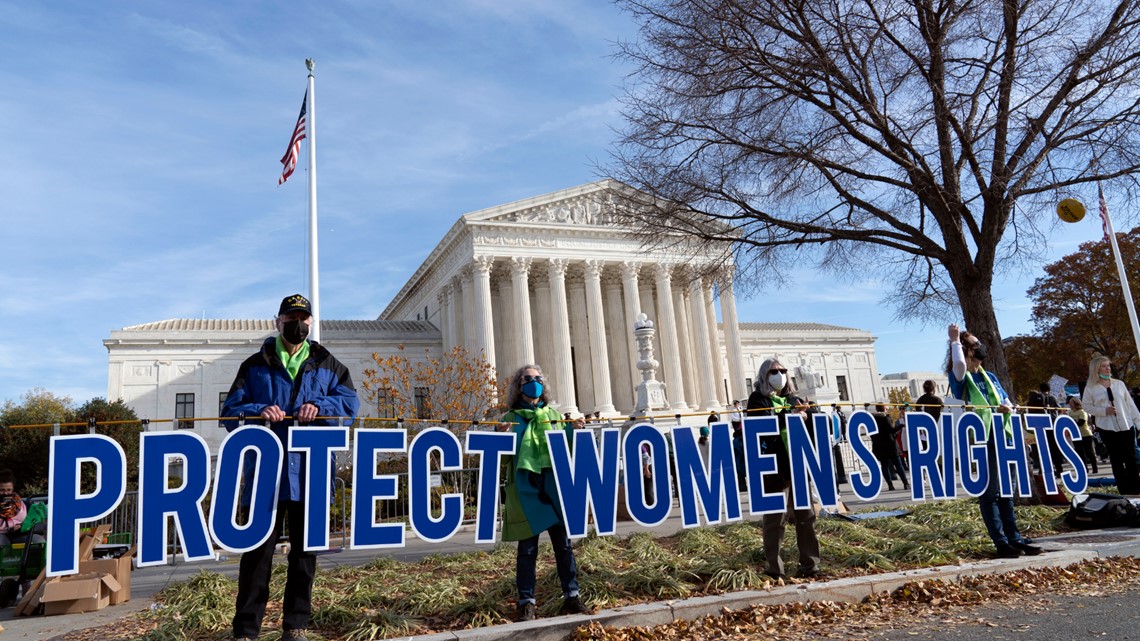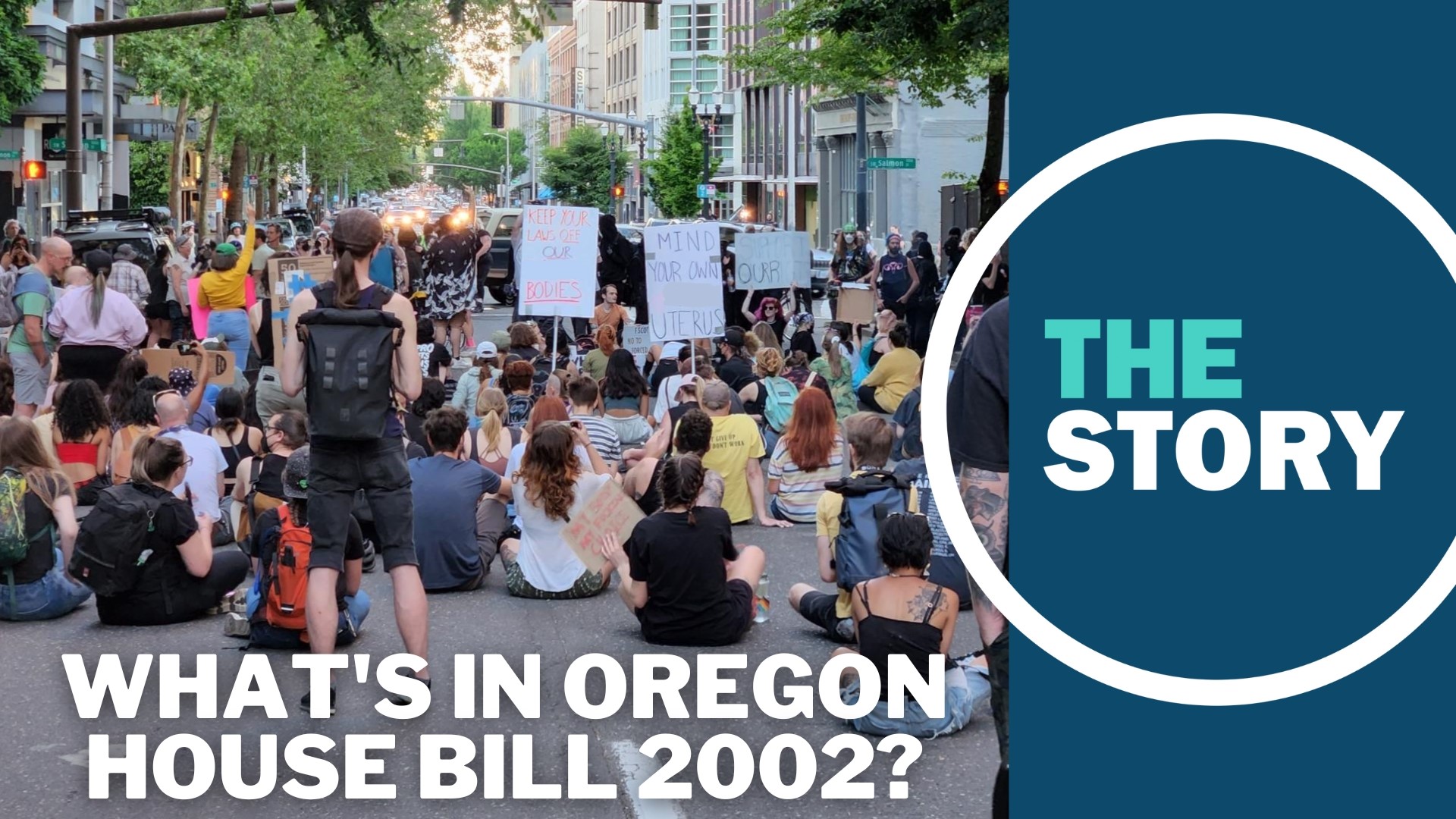SALEM, Ore. — While Oregon Republican lawmakers continue to cite long-ignored rules around bill readability as the primary reason for their Senate walkout, the focus of their ire from the beginning has been on one bill in particular — House Bill 2002.
The bill, which would expand access to abortion and gender-affirming care in Oregon, landed on the House floor early last week. House Republicans fought tooth and nail to keep the bill from a vote, but it ultimately passed the chamber along party lines the evening of May 1.
During that debate is when Republicans first debuted their argument that Democrats were violating a 1979 law requiring that bill summaries be readable at an 8th-grade level.
Republicans began their Senate walkout the next day, primarily citing those readability standards. Democrats have countered that Republicans are arguing in bad faith, considering that no one seemed to care or be conscious of the rule — in either party — until HB 2002 came up for a vote last week.
If there's one thing that both parties do seem to agree upon, it's that Republicans want to scuttle HB 2002. So what in the bill is so objectionable, and how does it differ from current Oregon law?
Abortion in Oregon
The U.S. Supreme Court's Dobbs decision overturned decades-long precedent in the form of Roe v. Wade, setting off a cascade of new restrictions on abortion in many states across the country. However, Oregon has maintained strong legal protections for abortion in recent years — including for young people.
At the same time, Oregon's laws surrounding parental consent for abortion are convoluted and incredibly difficult to tease out. The Story's Pat Dooris spoke with lawmakers, lawyers and policy experts, all in an attempt to answer one simple question: Can anyone, at any age, get an abortion in Oregon?
The short answer is yes, even under current law, as long as all of the medical care is done within state lines. But when it comes to abortion for minors, the question is whether they need parental permission.
Oregon Revised Statute 109.640 sets the age of consent for medical or dental treatment at 15 years old. It means that anyone 15 and older can seek medical care without telling a parent or getting their permission. This, without a doubt, does include abortions.
The same statute goes on to say that physicians "may provide birth control information and services to any person without regard to the age of the person." Under some interpretations, this could mean that anyone — at any age — has the right to get an abortion. But what's the definitive answer?
On the website for Oregon Health & Science University, under frequently asked questions about abortion, the university has this to say:
"If you are 14 or younger, Oregon law requires you to get consent from a parent or guardian for medical care, including abortion. At OHSU, we can connect you with confidential help if getting consent isn’t an option for you."
The section includes a link to the law, but it's a dead link. That's emblematic of the journey it took to get answers on this question.
For context on the conundrum, let's rewind a few decades.
Historically, Oregon had several laws restricting abortion. In the 1960s, state law required parental notification and consent before someone under the age of 18 got an abortion.
In 1971, Oregon passed the statute that allowed people 15 and older to seek their own medical care. At the the time, however, the law specifically excluded abortion from the list of covered procedures.
Then, in 1973, the Supreme Court decided Roe v. Wade, establishing the constitutional right to an abortion. That same year, Oregon's attorney general decided that the state's abortion laws were unconstitutional and could not be enforced.
A decade later, the Oregon Legislature decided to revisit those laws and fix them up. Unfortunately, they didn't do a great job. While they repealed the law requiring parental consent and notification, they did not clarify whether the repeal covered only people 15 and older or minors of any age.
In states where a parent's permission was needed for a minor to get an abortion, federal law required something called a "judicial bypass" system. That would allow the minor to ask a judge for permission if they couldn't get it from a parent for whatever reason. There are important instances why such a system would need to be in place.
However, Oregon never had a judicial bypass process. That left many people believing that those 14 and younger did not necessarily need parental consent for abortion.
But that was before the Supreme Court overturned Roe v. Wade. After the Dobbs decision tossed out the constitutional right to an abortion, the fact that Oregon law didn't explicitly address abortion for minors under age 15 became an even bigger question mark.


Now, Oregon's rules around age of consent for abortion seem to depend on who you ask.
This came up during a meeting of the Oregon Legislature's Ways and Means Committee in mid-April. Lawmakers were discussing HB 2002 when the matter of parental notification arose. The question came from Senate Republican Leader Tim Knopp, directed at a member of the legislative counsel's office — the lawyers for the legislature.
"So in this bill, at what age can a child make the determination on their own without parental consent to have an abortion?" Knopp asked.
"Under the current law, it's not entirely clear what age a minor can make the determination to have an abortion without parental consent," the lawyer replied. "Under House Bill 2002, however, it's a minor of any age can make that determination."
"So, follow-up," Knopp said. "So a 10-year-old can make that decision on their own then?"
"Yes," the lawyer responded.
That provoked some commotion among members of the committee, as they didn't seem to know whether that answer applied to current law or HB 2002.
"Sorry, let me clarify," the lawyer broke in. "Under House Bill 2002, a minor of any age can make reproductive health care decisions, and that includes undergoing an abortion."
During that same hearing, Democratic Sen. Elizabeth Steiner, a medical doctor who helped sponsor HB 2002, said that in cases where a minor child gets an abortion, police and the Oregon Department of Human Services are notified. The child is strongly encouraged to allow parental notification under most circumstances.
However, if the child became pregnant through incest, for example, and the mother is not cooperating in the child's protection, then it would be dangerous to the child for parents to be notified — and that notification would not be required, Steiner said.
Abortion under HB 2002
The lack of clarity referenced by the legislative counsel is part of why Democrats are pushing the new law — it would ensure that there's no doubt around minors rights to get an abortion with or without parental permission.
According to the non-partisan Legislative Policy and Research Office, HB 2002 changes the wording of Oregon law, making it clear that abortion is explicitly available to people of any age without parental notification, as are other forms of reproductive care.
"A minor of any age may give consent, without the consent of a parent or guardian of the minor, to receive reproductive health care information and services," the bill states.
Importantly, the bill takes out the words "birth control information and services," replacing them with "reproductive health care information and services." Reproductive health care is defined in HB 2002 as including a number of services, including birth control, emergency contraception and abortion.
Cases like these — where a minor under 15 becomes pregnant and seeks an abortion — are rare but not unheard of, even under current law. The Oregon Health Authority has a dashboard for abortion statistics in the state. The most recent numbers are from 2021, when 7,100 people had abortions. Of those patients, 14 were under the age of 15 years old.
HB 2002 would also require community colleges, universities and other higher education institutions to provide students access to emergency contraception and medication abortions.
Though Republicans in the Oregon legislature have almost all opposed HB 2002, there was one member of the caucus who voted in favor. Rep. Charlie Conrad serves District 12, which is west of Eugene. He wrote a letter in order to set down a public record of his reasoning after parting ways with his colleagues:
"Although I remain cautious about the possibility of providing reproductive health services to minors without active involvement of their parents or guardians, this bill does not change the treatment currently being provided — rather, it ensures equitable access to reproductive health care for all Oregonians," Conrad wrote, in part. "This bill does not alter abortion services currently being provided, but instead codifies existing practices and provides legal protections for service providers."
"As a police officer for 14 years, I also know that many children have irresponsible or absentee parents who sometimes leave children to fend for themselves," Conrad continued. "In these situations, children are left to rely on kind and caring adults such as parents of friends or other members of their extended family to help them. I want to ensure these teenagers are not forgotten and have the option to receive the health care they need with the help and support of other responsible adults."
Changes to gender-affirming care
HB 2002 also makes some changes to health care for transgender people, though they are likewise not as dramatic as they might have been made out to be.
First, the bill defines "gender-affirming treatment" as a procedure, service, drug, device or product that a physical or behavioral health care provider prescribes to treat an individual for incongruence between the individual's gender identity and the individual's sex assignment at birth.
Under current Oregon law, insurance companies are not required to cover all of these forms of treatment. However, the state agency that regulates insurance companies has issued bulletins essentially directing insurance companies to cover them.
HB 2002 would put that requirement into law, listing a number of specific procedures that must be covered to the extent that a health care provider determines they are medically necessary.
According to the Legislative Policy and Research Office, HB 2002's requirements around gender-affirming care would not apply to insurance companies that are outside of state jurisdiction, which includes Medicare and large companies that self-insure.
Even under current Oregon law, gender-affirming care is treated as broadly medically necessary. For people 15 and older, a parent's permission is not needed. Those 14 and younger do require permission, and HB 2002 does not change that.
The bill also explicitly states that voluntary sterilization does not qualify as reproductive care for minors under 15 years of age, meaning people 14 and under will not be able to seek it on their own.
Finally, HB 2002 protects health care providers that may be licensed in another state — like Idaho, for instance — forbidding Oregon regulators or insurance companies from punishing those companies if they lose their license in that other state for providing abortions or gender-affirming care.
In all, HB 2002 is 46 pages long, so there is more to it than just these points. However, much of that space is dedicated to existing statutes, fiddling with definitions and enumerating more specifically some of the rights that may have been implied under current law but were not specified.

